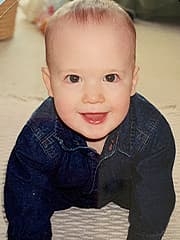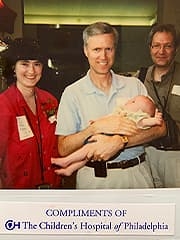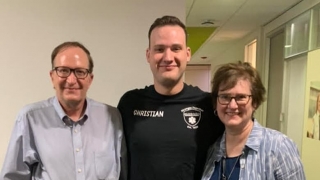Christian’s Story: 22 Years After Fetal Surgery for Spina Bifida
Published on
Published on
Growing up in Grayslake, Illinois, about 40 miles north of Chicago, Christian never felt much different than his peers. It’s a testament to the pioneering treatment he received at Children’s Hospital of Philadelphia (CHOP) before birth.
 In 2000, Christian had fetal surgery for spina bifida at CHOP
The year was 2000. Kimberly and Kent were excitedly expecting their first child. Then, just days before Christmas, a prenatal blood test showed a higher-than-normal alpha-fetoprotein (AFP) level, a sign of spina bifida. Imaging during a follow-up appointment found the fetus had myelomeningocele (MMC), the most severe form of spina bifida. The spinal column hadn’t closed around the spinal cord.
In 2000, Christian had fetal surgery for spina bifida at CHOP
The year was 2000. Kimberly and Kent were excitedly expecting their first child. Then, just days before Christmas, a prenatal blood test showed a higher-than-normal alpha-fetoprotein (AFP) level, a sign of spina bifida. Imaging during a follow-up appointment found the fetus had myelomeningocele (MMC), the most severe form of spina bifida. The spinal column hadn’t closed around the spinal cord.
An MMC opening exposes the spinal cord to damage during fetal development. It can cause lifelong disabilities including paralysis, bladder and bowel problems, hydrocephalus (excessive fluid pressure in the brain), and cognitive impairments.
“I was frightened about what kind of challenging circumstances we were going to face,” recalls Kimberly. “It’s the unknown that’s really the most frightening. We really didn’t know what spina bifida was.”
Kent worked for a major medical device manufacturing company. He sought advice about the diagnosis from the company’s medical director, who had previously served as a pediatric surgeon at the Mayo Clinic. The medical director knew about amazing developments being made in the then-burgeoning field of fetal medicine, specifically by N. Scott Adzick, MD, founder and director of the Richard D. Wood Jr. Center for Fetal Diagnosis and Treatment at Children’s Hospital of Philadelphia (CHOP). Adzick and his team at the Center had pioneered a surgical procedure to repair MMC before birth and had been performing it at CHOP since 1998.
The medical director recommended the family go to CHOP for a second opinion. The rest is, literally, history.
 Baby Christian with N. Scott Adzick, MD. The team at CHOP were pioneers in the surgical procedure to repair MMC before birth.
Christian was the 14th patient to undergo fetal surgery for MMC at CHOP. At the time of his surgery, the CHOP team had already found that addressing spina bifida by operating on the baby in the womb — months before birth — offered significant success in reducing the need to divert fluid from the brain, improving neurologic function and increasing the likelihood that a child would be able to walk independently.
Baby Christian with N. Scott Adzick, MD. The team at CHOP were pioneers in the surgical procedure to repair MMC before birth.
Christian was the 14th patient to undergo fetal surgery for MMC at CHOP. At the time of his surgery, the CHOP team had already found that addressing spina bifida by operating on the baby in the womb — months before birth — offered significant success in reducing the need to divert fluid from the brain, improving neurologic function and increasing the likelihood that a child would be able to walk independently.
Ten years after Christian’s birth, CHOP’s early success with the procedure was confirmed in a landmark nationwide clinical trial that conclusively established the effectiveness of prenatal spina bifida surgery.
Another breakthrough in that time was the opening of CHOP's Garbose Family Special Delivery Unit (SDU), the first comprehensive birth facility in a freestanding pediatric hospital designed specifically for mothers carrying babies with birth defects. The SDU has revolutionized the birth experience for families by keeping mother, baby and family in one space for labor, birth and the postpartum experience.
Most people outside of his family don’t know Christian had spina bifida. His prenatal hindbrain herniation from the MMC was reversed in the womb after fetal surgery. He was born slightly early, at 36 weeks, but didn’t suffer any major complications from prematurity. As a youth, he participated on a swim team and played basketball in a rec league.
Growing up, Christian had a weak bowel and bladder. That care, as well as most of his medical care since birth, was managed by a specialist in Chicago.
He learned to use a catheter on his own at age 7 to achieve social continence, and he became fully continent at age 12. His mother credits a combination of “paying attention, control and maturity.”
“One day when he was 12, he said, ‘I’m wearing boxers to school,’” she says. “He’s basically been managing that on his own since.”
That same year, Christian began attending a summer camp for kids with spina bifida. At age 16, the camp hired him as a camp counselor.
 Christian at his EMT graduation with his parents.
Christian has continued to grow on his own curve. After high school, when most of his friends went to college, he began working, first as a security guard, then as an emergency medical responder. When he took on the role of driving an ambulance, the company offered to train him to be an EMT for free.
Christian at his EMT graduation with his parents.
Christian has continued to grow on his own curve. After high school, when most of his friends went to college, he began working, first as a security guard, then as an emergency medical responder. When he took on the role of driving an ambulance, the company offered to train him to be an EMT for free.
Christian is now a tall, handsome 22-year-old. He recently passed his national certification to become an emergency medical technician (EMT). It’s incredible to think about how many lives he will now impact.
“We are really happy for him,” says his mom, proudly. “It really feels like lots of things have come together. I can’t help but think that his frequent exposure to the medical field and having a kind and concerned medical team led to his interest and comfort in this field.”
The family has seen their CHOP clinicians only a few times over the past two decades, but they never visit Philadelphia without stopping through to reunite with the team.
“They’re very important people to us,” says Kimberly. “We’re so glad that we were united with them. I have the highest esteem for them and am really glad that we could be pioneers for them.”
“It was quite an adventure, to look back,” she adds. “It’s hardly a part of our life anymore, and we’re really grateful for that. Before, it was just about trying to keep kids alive, and now there’s a lot more hope of meeting their greater potential. There is more hope and less suffering. And that’s what we all do this for. Anything to help the cause.”